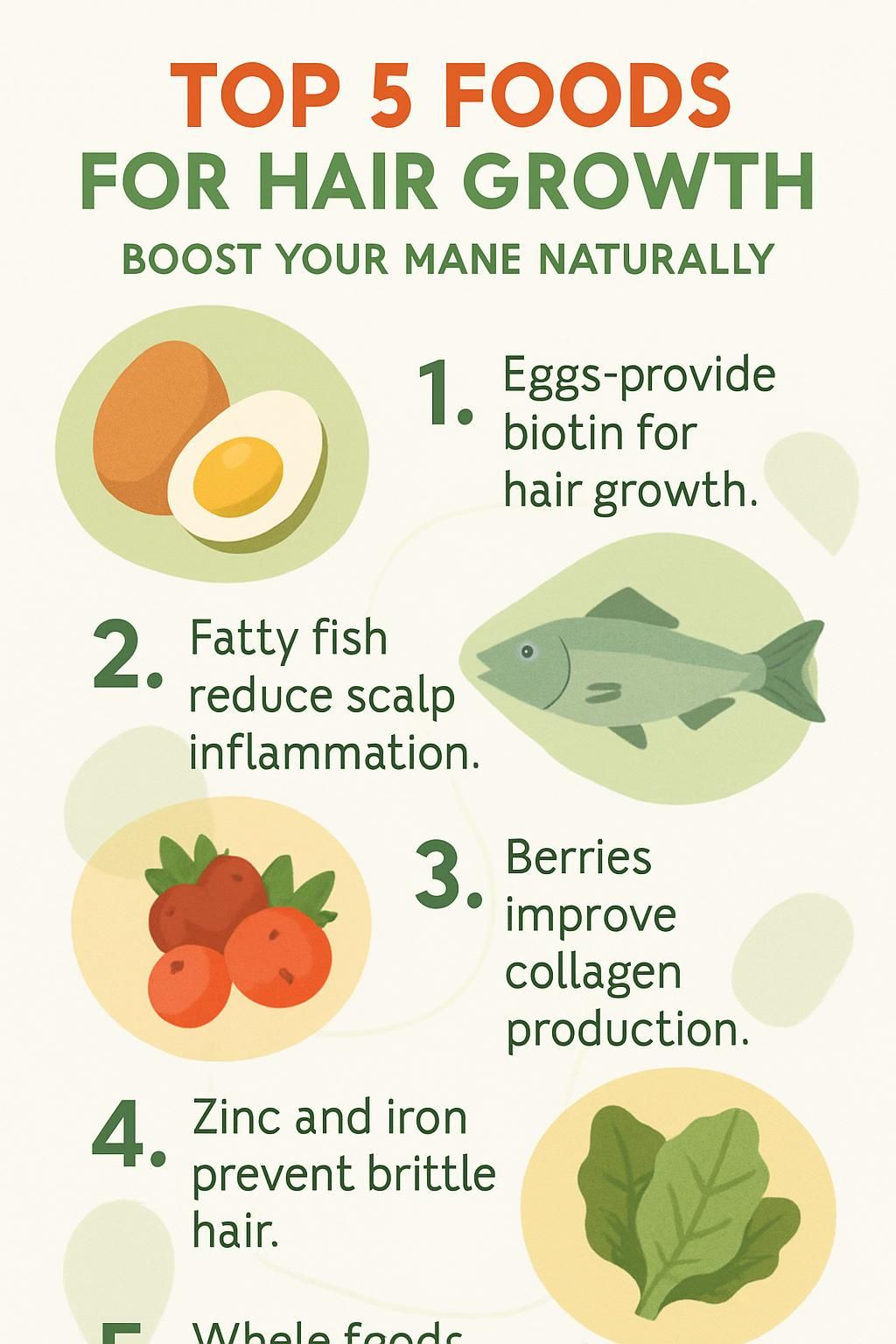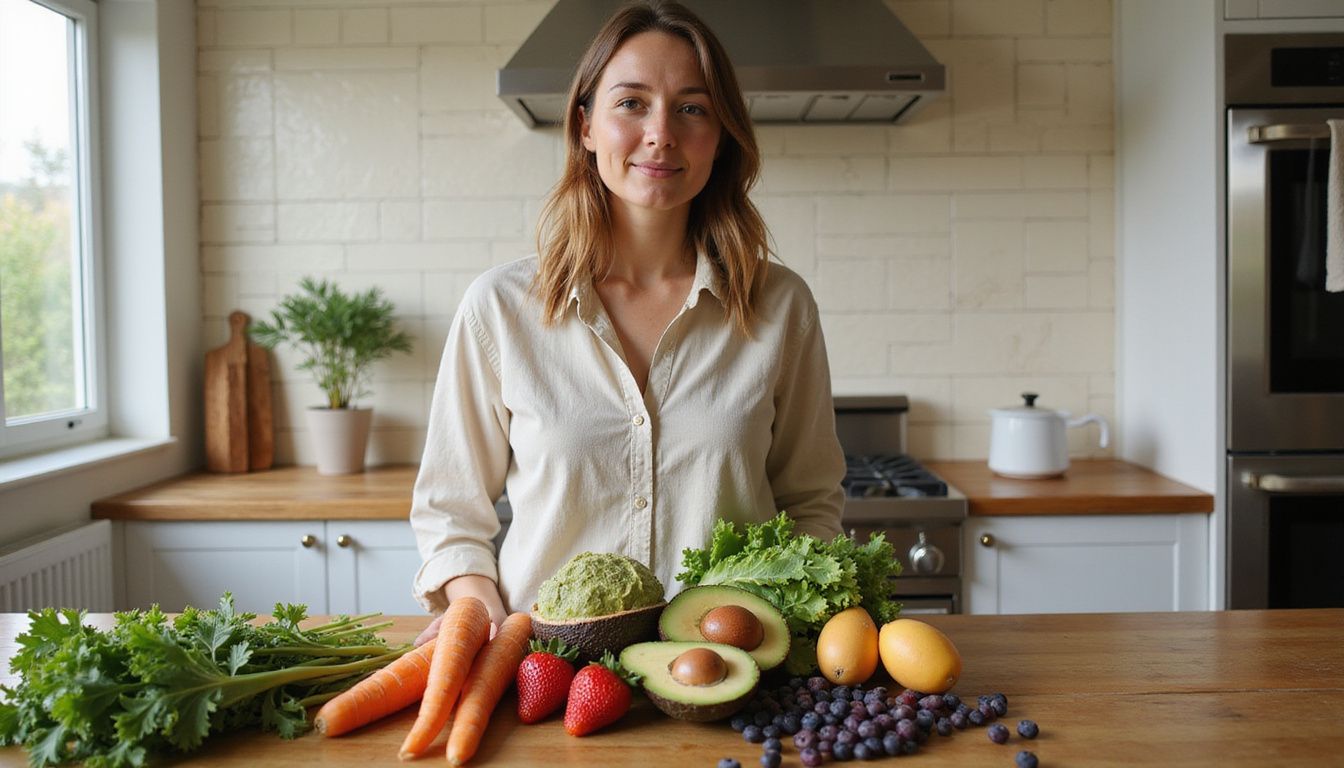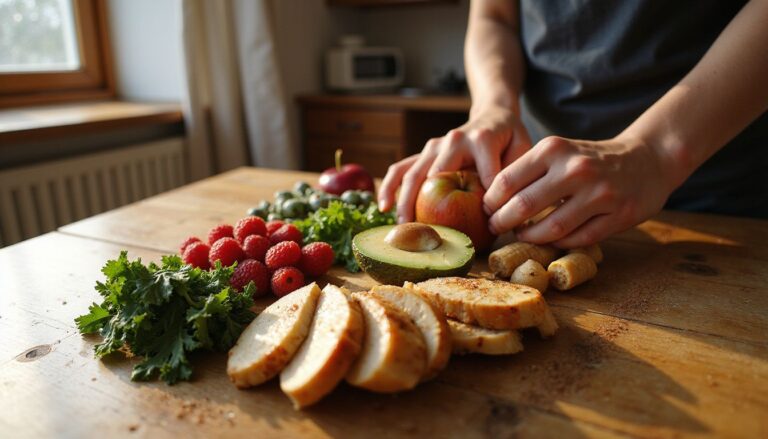Top 5 Foods For Hair Growth: Boost Your Mane Naturally
Our Nutrition Assistant AI Suite will transform your body. You will lose fat, get toned, and build muscle. Gain confidence and optimal health.
If you struggle with hair thinning or slow hair growth, you are not alone. Food choices affect your scalp and strands, and missing key nutrients often links to hair loss in studies.
In this guide, I share the top five foods that support healthy hair and explain why they work. Small shifts at mealtime can strengthen your roots, improve shine, and support steady growth over time.
Key Takeaways
- Eggs, berries, spinach, fatty fish, and sweet potatoes supply biotin, iron, omega-3 fatty acids, and beta-carotene that help promote hair growth.
- Low intake of protein, zinc, or iron can trigger brittle hair or diffuse shedding, as reported in the Journal of Clinical and Diagnostic Research, 2015.
- Omega-3 fatty acids in fish calm scalp inflammation; vitamin C in berries supports collagen for stronger strands.
- Ultra-processed foods high in sugar and low in vitamins A, C, and B groups relate to higher risk of thinning hair, according to Nutrients, 2022.
- Balanced meals usually work better than supplements for healthier hair unless lab tests show a deficiency.

The Importance of Nutrition for Hair Growth

Nutrition shapes how your hair grows and how strong each strand becomes. A steady intake of vitamins and minerals helps your follicles, the tiny sacs that grow hair, do their job well.
How does diet affect hair health?
A nutrient-dense diet supports growth and reduces breakage. Protein helps form keratin, the main hair protein that gives structure and strength.
Iron carries oxygen to the scalp; vitamin C improves iron absorption and lowers oxidative stress, which is cell damage from free radicals. Both actions support an active growth cycle.
Shortfalls in biotin or zinc can lead to brittle strands or added shedding. After I made eggs, spinach, berries, and salmon weekly staples, my hair felt fuller within three months.
Vitamin A from sweet potatoes and leafy greens helped my scalp stay comfortable during winter. Healthy eating has a visible effect on shine and resilience.
What are the signs of nutritional deficiencies on hair?
Poor nutrition often shows up first in hair. Thin, brittle, or shedding hair can point to low protein, iron, or B vitamins such as biotin and folate.
Flat, dull hair may signal a lack of healthy fats like omega-3 fatty acids. Some people develop patchy loss, called alopecia, from iron deficiency or low zinc.
Split ends and dryness can reflect low antioxidant intake, including vitamins C and E. White flakes may suggest gaps in minerals that support oil glands in the scalp.
These clues often appear before you notice other body changes, which makes hair a useful early signal.
Eggs: A Protein and Biotin Powerhouse
Eggs deliver high-quality protein and biotin, a B vitamin that helps convert food to energy. Together, they support strong, steady hair growth.
How does protein support hair structure?
Hair is primarily made of keratin, a structural protein. Dietary protein provides the amino acids your body uses to build new keratin and repair weak spots.
Low protein intake can slow growth and increase breakage. People in studies with low protein sometimes develop diffuse thinning due to changes in the hair cycle.
Eating complete proteins, such as eggs or lean meats, supports shine and strength over many wash cycles. It also helps your hair bounce back after styling stress.
Why is biotin important for hair strength and growth?
Biotin supports keratin production and healthy cell activity. When levels drop, hair may become fragile and nails may split more easily.
When I improved my biotin intake, my nails firmed up first, then my hair followed. Eggs make it simple since they provide both biotin and protein in one meal.
Eating biotin-rich foods can support healthy growth cycles, reduce deficiency-related shedding, and improve hair quality.
Berries: Packed with Antioxidants and Vitamin C
Berries supply vitamin C and a mix of antioxidants. These nutrients protect follicles from stress and help your scalp environment stay healthy.
How does Vitamin C help collagen production for hair?
Vitamin C is needed to build collagen, a protein that supports skin and the area around hair follicles. It helps stabilize collagen fibers, which adds durability.
More collagen can mean stronger strands with less breakage. A daily serving of vitamin C foods, such as strawberries or oranges, supports this process.
Regular intake is key; your body does not store vitamin C for long. I keep frozen berries on hand to make it easy.
How do antioxidants protect hair follicles?
Antioxidants neutralize free radicals, which are unstable molecules that damage cells. Less oxidative stress can mean calmer scalps and healthier follicles.
Foods like berries, spinach, and nuts are rich in protective compounds. Research links higher antioxidant intake with a lower risk of pattern hair loss by supporting scalp health.
After I added more fruits and vegetables, I noticed less shedding in the shower and better strand strength.
Spinach: A Nutrient-Dense Superfood for Hair
Spinach delivers iron, vitamin A, and vitamin C, all important for hair and scalp. It also helps prevent iron-deficiency anemia, a common cause of thinning.
How does iron in spinach help prevent hair thinning?
Iron helps red blood cells carry oxygen to every tissue, including hair follicles. Oxygen supports energy production and steady growth at the root.
Low iron stores, measured as ferritin, can increase shedding. One cup of cooked spinach provides about 15 percent of your daily iron needs.
Pair spinach with vitamin C foods like peppers or oranges to improve absorption of non-heme iron from plants. That combination helped me lift my energy and reduce shedding.
What role do Vitamins A and C play in scalp health?
Vitamin A supports sebum production, the natural oil that keeps scalps hydrated and comfortable. Too little can lead to dryness and itch.
Vitamin C acts as an antioxidant and aids collagen formation in skin. Both actions support strong blood vessels that feed each follicle at the base.
Spinach provides both vitamins, which makes it a practical choice for hair-friendly salads and sautés.
Fatty Fish: Omega-3s for Healthy Hair Follicles
Fatty fish like salmon supply omega-3 fatty acids that support scalp comfort and shine. After I ate more fish, my scalp felt calmer and less itchy.
How do omega-3s reduce scalp inflammation?
Omega-3 fatty acids help reduce inflammatory signals called cytokines. High cytokine levels can lead to redness, flaking, and irritation.
Clinical research shows higher omega-3 intake links with fewer scalp symptoms. I saw fewer itchy spots after adding salmon and chia seeds to my routine.
Lower inflammation helps protect follicles during the hair growth cycle. It may also support thicker, more consistent growth over time.
How do omega-3s promote shiny, hydrated hair?
Omega-3 fatty acids are part of cell membranes in the scalp and hair shaft. Healthy membranes hold moisture and improve nutrient flow.
Over eight weeks of eating fish twice a week, my hair gained a soft gloss. My stylist mentioned it without me saying a word.
Studies suggest omega-3s can reduce protein loss from hair and support scalp hydration. Mackerel and sardines are great options if you want to improve shine naturally.
Sweet Potatoes: Nature’s Source of Beta-Carotene
Sweet potatoes are rich in beta-carotene, which your body converts to vitamin A. Vitamin A supports growth, scalp moisture, and a healthy skin barrier.
How does beta-carotene boost scalp moisture?
Beta-carotene acts as an antioxidant and converts to vitamin A as needed. Vitamin A helps the scalp produce sebum, the oil that keeps hair comfortable and hydrated.
One medium baked sweet potato can provide more than 150 percent of daily vitamin A needs. Carrots, spinach, and kale also supply beta-carotene.
Getting enough supports moisture balance and lowers the chance of dry, brittle strands. I lean on roasted sweet potatoes during colder months for this reason.
How does Vitamin A support hair growth?
Vitamin A supports cell growth across the body, including scalp tissue. It also helps oil glands coat each strand with protective lipids.
Foods high in beta-carotene, like sweet potatoes and carrots, let the body convert only what it needs. Too much preformed vitamin A from supplements can cause hair loss, so balance matters.
As I increased leafy greens and orange vegetables, I saw fewer split ends and less breakage over time.
With vitamins covered at the root level, I like to layer in other foods that round out a hair-healthy plate.
Additional Foods to Support Hair Growth
Several other foods supply fats, protein, and minerals that protect follicles. I use a mix each week to cover gaps and support steady growth.
What benefits do avocados offer for hair health?
Avocados provide monounsaturated fats that moisturize the scalp from within. They also offer vitamin E, an antioxidant that supports cell membranes and growth.
Research shows higher vitamin E intake can reduce hair loss in some people. After two months of eating avocados a few times a week, my hair felt softer and looked glossier.
They also contain B vitamins, including biotin and vitamin B6, which help nourish follicles and support protein metabolism.
How do nuts and seeds contribute to hair growth?
Nuts and seeds provide vitamin E, zinc, selenium, and omega-3 fatty acids. These nutrients support cell defenses and help hair hold moisture.
I add pumpkin seeds to oatmeal for zinc, which supports the hair cycle and may lower the risk of telogen effluvium, a stress-related shedding phase. Walnuts offer biotin, and sunflower seeds supply protein for structure.
One small handful can deliver about one-third of the daily vitamin E value. Plant-based eaters can use these daily to support hair without relying on animal protein.
Why are beans and lentils good for hair?
Beans and lentils deliver plant protein that helps build keratin. They also provide biotin, iron, zinc, and folate, which support red blood cell production.
Half a cup of cooked lentils meets about 10 percent of daily iron needs for many women, based on USDA data. Adding black beans to salads and chickpeas to soup helped my roots feel stronger within two months.
They are budget friendly and easy to prep, which makes consistency realistic.
How does zinc from oysters help hair health?
Zinc supports tissue repair and oil gland function around follicles. Low zinc links with conditions like alopecia areata and some female pattern loss.
Oysters are a top source. Six medium oysters can provide more than 250 percent of the adult daily value.
Regular intake from food supports scalp health and nail strength since zinc helps with cell production in both tissues.
Tips for Incorporating Hair-Healthy Foods into Your Diet
I rotate eggs, berries, spinach, fatty fish, and sweet potatoes into weekly meals. Here are simple ways you can do the same starting today.
What are some meal ideas and recipes for hair health?
Try scrambled eggs with spinach and whole grain toast for protein, iron, and biotin. A Greek yogurt bowl with mixed berries adds vitamin C and antioxidants.
Build a grilled salmon salad for omega-3s that calm the scalp. For a plant-based dinner, make lentil and sweet potato stew for beta-carotene, iron, and fiber.
My go-to smoothie blends berries, baby spinach, plain yogurt, chia seeds, and oats. Stir avocado into brown rice or quinoa for vitamin E and healthy fats.
Lean red meat once a week supplies zinc and vitamin B12. Snack on nuts, or add beans to soups to raise your intake without extra cooking time.
How can I balance nutrients for better hair growth?
I aim for variety. Each day I include lean protein, whole grains for energy, and colorful produce for antioxidants.
Spinach covers iron to help prevent thinning; berries provide vitamin C for collagen. Oysters or nuts bring zinc, and fish or avocado provide healthy fats.
I use a simple food diary to spot gaps early. That habit helped me avoid restrictive patterns that once led to extra shedding.
Foods to Avoid for Better Hair Health
Certain foods can work against your scalp and strands. Knowing what to limit helps the rest of your plan work better.
Why avoid sugary snacks for hair health?
Sugary snacks spike blood sugar and insulin. Higher insulin can raise androgens, hormones that may thin hair in some people.
Harvard sources note regular high sugar intake disrupts hormones that affect follicles. I noticed a drier scalp during candy-heavy weeks.
Choosing fruit or nuts gives steady energy and adds vitamins that support growth, such as vitamin C and biotin.
How do processed foods affect hair?
Ultra-processed foods often pack sugar, salt, and unhealthy fats while lacking key vitamins and minerals. Diets low in protein and iron can lead to brittle hair and more shedding.
A 2022 Nutrients study linked higher intake of these foods with greater odds of hair loss. During a busy exam season filled with packaged snacks, my hair went dull fast.
Additives may also irritate the scalp and make repair harder. Over time, that can weaken follicles.
What impact does excessive alcohol have on hair?
Heavy drinking can block the absorption of zinc, iron, and several vitamins. My hair turned brittle during a stretch when I drank more and ate poorly.
Alcohol also raises oxidative stress, which damages cells, including follicles. Studies connect heavy intake with deficits in vitamin B3, biotin, and protein, all needed for strong hair and nails.
If alcohol is part of your week, add protein- and mineral-rich foods and stay hydrated.
Lifestyle Tips to Complement Your Diet
Daily habits shape hair health just as much as food choices. I saw the best results when I paired nutrition with simple routines.
How does staying hydrated improve hair health?
Water helps scalp and hair cells work well. Without enough fluids, hair can grow dry and brittle, and shedding may increase.
Good hydration supports a balanced cell environment and steady growth. When I raised my water intake after a low-carb phase, my hair and nails looked better within weeks.
Hydration also makes any nutrient plan or multivitamin work more smoothly.
What are effective ways to reduce stress for better hair?
Stress can push hair into a shedding phase called telogen effluvium. Regular exercise lowers cortisol, a stress hormone that affects scalp health.
Meditation and deep breathing calm the nervous system and support thyroid balance. I also schedule short outdoor walks to reset during busy days.
Good sleep supports cell repair, and limiting caffeine helps avoid hormone spikes that can slow growth.
Why is getting enough sleep important for hair growth?
Sleep is when your body repairs tissues and boosts growth hormone. Both support strong follicles and new strands.
Too little sleep raises cortisol and can trigger or worsen some hair loss conditions. Poor sleep also reduces nutrient absorption, which limits iron and zinc delivery to the scalp.
Aiming for seven to nine hours has been the single most helpful change for my routine.
Frequently Asked Questions
Many readers ask how daily eating patterns affect hair. Here are clear answers based on research and practical experience.
What foods promote faster hair growth?
Eggs provide complete protein and biotin to support new strand formation. Berries add vitamin C and antioxidants that protect follicles.
Fatty fish like salmon supply omega-3 fatty acids to calm the scalp and support moisture. Spinach brings iron, vitamin A, and vitamin C to help prevent thinning.
Sweet potatoes contribute beta-carotene that turns into vitamin A for scalp comfort. When I eat these foods regularly, my texture and fullness improve.
Can a poor diet cause hair loss?
Yes. Diets low in protein, iron, zinc, or key vitamins can lead to excess shedding.
In the Journal of Clinical and Diagnostic Research, 2015, 89 percent of people with diffuse loss had at least one deficiency. I saw more breakage during a strict, low-calorie phase without careful planning.
Restoring missing nutrients often helps, but progress takes months. Severe or sudden loss needs medical evaluation.
Are supplements necessary for hair health?
Most people can meet needs through food. Supplements such as biotin, iron, or zinc help when tests confirm a deficiency or when a medical condition limits absorption.
A 2019 review found extra nutrients do not speed growth unless you are deficient. I reach for eggs for biotin and protein, and spinach for iron, before I consider a pill.
Talk with a healthcare professional before starting any supplement, especially if you have a health condition or take medication.
Conclusion
Choosing the right foods can support healthy hair growth in a steady, lasting way. Eggs, berries, spinach, fatty fish, and sweet potatoes deliver protein, biotin, iron, omega-3 fatty acids, and beta-carotene that your scalp and strands need.
These nutrients strengthen each strand and support a calm, nourished scalp. Small daily changes improved my hair, and they can help you too.
This article is for general education, not medical advice. If you notice rapid loss, new bald patches, or scalp pain, seek care from a licensed clinician.
FAQs
1. What are the top foods that promote healthy hair growth in people?
Eggs, spinach, sweet potatoes, salmon, and nuts provide key nutrients for hair and nail health. These foods supply protein, iron supplement sources, β-carotene, and minerals essential for cell function.
2. How does diet affect hair loss or developed hair loss?
A balanced diet rich in vitamins and minerals supports strong cells in the scalp. Poor nutrition can lead to nutrient deficiencies that may cause or worsen hair loss based on scientific studies.
3. Which mineral is most important for boosting your mane naturally?
Iron plays a major role in carrying oxygen to cells including those responsible for growing new strands of hair. Iron deficiency has been linked to increased risk of thinning or shedding.
4. Can supplements help with effects on hair if my diet lacks certain nutrients?
Supplements for hair such as biotin or iron can fill nutritional gaps when dietary intake is low; however, evidence shows whole foods offer more complete benefits than isolated pills.
5. Does stress impact the role of nutrition in promoting healthy growth of nails and hair?
Chronic stress affects cell biology by disrupting nutrient absorption from food which may slow down natural processes involved in maintaining strong nails and vibrant locks according to research findings.
Summary: Eating eggs as food along with leafy greens like spinach provides vital protein and minerals needed for optimal growth cycles of both nails and strands on your head. Including these items regularly helps counteract negative effects caused by poor nutrition or ongoing stress while supporting overall wellness backed by credible data.






